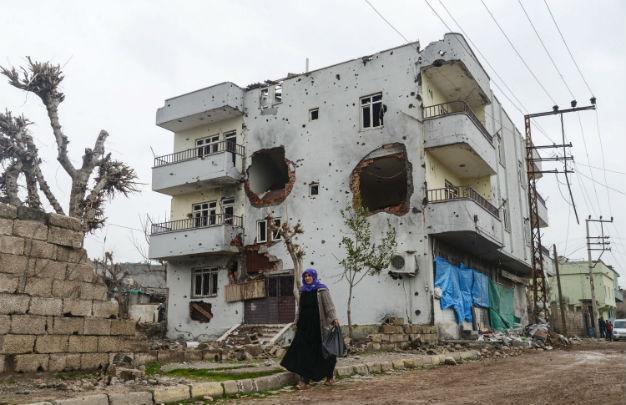Turkish gov’t plans to rebuild conflict-hit regions through stricter security, urban transformation
ANKARA

AFP photo
Fortification of security forces both in numbers and with building of new military installations appeared to have been two key and concrete items in a “master plan” drafted by the Turkish government in a bid to fight “terrorism,” while urban transformation is an essential part of measures aiming to restore economic and social life in eastern and southeastern Turkey.The main opposition Republican People’s Party (CHP), however, suggested that the government’s “shallow” plan, which has been dubbed as the “Action Plan for Fight against Terror and Rehabilitation,” for the region heralds “depopulation” and “evacuation” of residential areas in those regions.
Citing officials from the Interior Ministry as sources, the state-run Anadolu Agency elaborated on the action plan’s content, which is expected to be announced by Prime Minister Davutoğlu during a visit to the southeastern province of Mardin on Feb. 5.
In its report on Feb. 2, the agency mentioned two separate plans, the “Master Plan for Fight against Terror” and ““Action Plan for Fight against Terror and Rehabilitation,” saying that the ruling Justice and Development Party (AKP) government plans to take simultaneous “steps for effective fighting against terrorism” and “steps for restoring economic and socio-cultural environment in which terror finds ground.”
Over the weekend, Davutoğlu said Diyarbakır’s historical Sur district would be rebuilt to erase the scars of weeks-long clashes between security forces and militants of the outlawed Kurdistan Workers’ Party (PKK), citing Spain’s reconstruction of historic Toledo as an example.
“On one side, you keep the parliament closed and on the other side you say ‘I’m meeting with opinion leaders and will solve the problem,’” CHP’s Istanbul deputy Sezgin Tanrıkulu said at a press conference at parliament on Feb. 2.
Parliament’s general assembly and commissions have been on a week-long recess and will return to work on Feb. 8. Davutoğlu hosted opinion leaders from East and Southeast Anatolia on Feb. 2.
“They are trying to develop other mechanisms while keeping the parliament closed and not building a dialogue mechanism at the parliament. They will turn Sur into Toledo. Can they say ‘Let’s rebuild the Sultanahmet [Istanbul’s Blue Mosque] like the Vatican’s Colosseum, the Ankara Castle like Prague and Konya like the Vatican?’ Can anybody accept this?” Tanrıkulu asked.
4,000 additional police officers
All institutions and organizations affiliated with the state will be part of the master plan in which “the fight against terrorism, but not terrorists, will be on the front burner,” the agency said, noting that the master plan would be implemented with the undersecretary of public order and security leading all efforts.
As part of the plan, the agency referred to a cabinet decision that went into force on Jan. 28 and according to which, 39 new fortified military installations have gone into force, with a majority of new security posts to be built in southeastern Turkey.
The National Police Department will meanwhile appoint more than 4,000 expert police officers in residential areas that have been “cleansed through operations” in order to “prevent the restructuring of terrorists.” Those police officers will be transferred from provinces where there are no operations at the moment.
TOKİ and ‘guidance psychologists’
The Environment and Urban Planning Ministry will conduct efforts for urban transformation in these same regions for “the cleaning of buildings that may pose risks for human health and life safety” and to “build more livable housings.” These efforts will be implemented jointly by the Culture and Tourism Ministry and the Housing Development Administration (TOKİ).
Through the Family Social Support Program (ASDEP) currently being run by the Family and Social Policies Ministry, social service experts and psychologists have been “guiding” families who have had to abandon their houses in their “new lives.”
The Labor and Social Security Ministry has, meanwhile, planned moves to ease people’s lives in the region, though it has not elaborated on its planned measures.
















